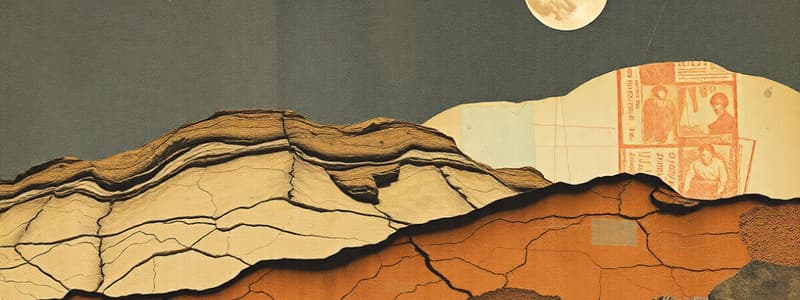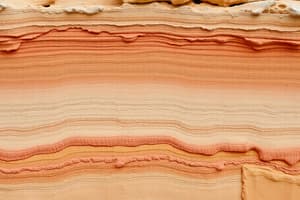Podcast
Questions and Answers
Which weathering process involves the application of pressure by growing salt crystals?
Which weathering process involves the application of pressure by growing salt crystals?
- Hydration
- Salt Wedging (correct)
- Oxidation
- Carbonation
What is the primary result of the abrasion weathering process?
What is the primary result of the abrasion weathering process?
- Removal of soluble minerals from rocks
- Formation of new minerals
- Breaking down of larger rocks into smaller particles (correct)
- Chemical alteration of minerals
Which of the following results from the carbonation process?
Which of the following results from the carbonation process?
- Hydration of mineral structures
- Crystallization of salts
- Formation of acidic solutions (correct)
- Dissolution of atmospheric gases
Hydrolysis primarily involves which of the following interactions?
Hydrolysis primarily involves which of the following interactions?
What major effect does hydration have on rock structures?
What major effect does hydration have on rock structures?
What is the primary distinction between physical weathering and chemical weathering?
What is the primary distinction between physical weathering and chemical weathering?
Which of the following factors does NOT influence the rate of weathering?
Which of the following factors does NOT influence the rate of weathering?
What process is primarily responsible for the gradual weakening of rock due to the freezing and expansion of water within cracks?
What process is primarily responsible for the gradual weakening of rock due to the freezing and expansion of water within cracks?
Why is physical weathering more pronounced in desert climates?
Why is physical weathering more pronounced in desert climates?
Which agent of weathering involves the physical removal and transportation of weathered materials?
Which agent of weathering involves the physical removal and transportation of weathered materials?
Flashcards
Salt Wedging
Salt Wedging
Salt crystals growing in cracks of rocks, applying pressure and causing them to break apart.
Abrasion
Abrasion
Rocks wearing down other rocks as they are transported by water, ice, wind, or gravity.
Chemical Weathering
Chemical Weathering
Breakdown of rocks by chemical reactions, changing their composition.
Solution (Chemical Weathering)
Solution (Chemical Weathering)
Signup and view all the flashcards
Oxidation (Chemical Weathering)
Oxidation (Chemical Weathering)
Signup and view all the flashcards
Carbonation (Chemical Weathering)
Carbonation (Chemical Weathering)
Signup and view all the flashcards
Hydrolysis (Chemical Weathering)
Hydrolysis (Chemical Weathering)
Signup and view all the flashcards
Hydration (Chemical Weathering)
Hydration (Chemical Weathering)
Signup and view all the flashcards
Weathering
Weathering
Signup and view all the flashcards
Erosion
Erosion
Signup and view all the flashcards
Physical Weathering
Physical Weathering
Signup and view all the flashcards
Chemical Weathering
Chemical Weathering
Signup and view all the flashcards
Frost Wedging
Frost Wedging
Signup and view all the flashcards
Exfoliation
Exfoliation
Signup and view all the flashcards
Salt Wedging
Salt Wedging
Signup and view all the flashcards
Temperature Changes
Temperature Changes
Signup and view all the flashcards
Abrasion
Abrasion
Signup and view all the flashcards
Composition and structure of rock
Composition and structure of rock
Signup and view all the flashcards
Nature of ground slope
Nature of ground slope
Signup and view all the flashcards
Climatic variations
Climatic variations
Signup and view all the flashcards
Floral effects
Floral effects
Signup and view all the flashcards
Study Notes
Introduction to Physical Geology
- Earth is composed of rocks.
- Rocks are made of minerals.
- Earth is constantly changing, leading to changes in rocks.
Weathering
- Weathering: the physical disintegration or chemical alteration of rocks on or near Earth's surface.
- Erosion: the physical removal and transport of weathered material by water, wind, ice, or gravity.
Controlling Factors of Weathering
- Composition and structure of the rock
- Nature of the ground slope
- Climatic variations
- Floral effects
Agents of Weathering
- Wind
- Glaciers
- Running water
- Sea waves
- Underground water
Types of Weathering
- Physical weathering
- Chemical weathering
- Biological weathering
Physical Weathering
- Also known as mechanical weathering.
- Physical disintegration and reduction in the size of rocks without changing their chemical composition.
- Examples: exfoliation, frost wedging, salt wedging, temperature changes, and abrasion.
- Causes of physical weathering: changing temperature, freezing water, plant roots.
Mechanical Weathering Processes
- Exfoliation: Layers of rock peel off.
- Frost Wedging: Water expands when freezing inside cracks, forcing rocks apart.
- Salt Wedging: Dissolved salts crystallize in cracks, pushing rocks apart.
- Temperature Changes: Repeated heating and cooling cause expansion and contraction, weakening rocks.
- Abrasion: Rocks collide with each other, wearing them down.
Mechanical Weathering: Frost Wedging
- Water trapped in cracks freezes and expands, widening the cracks over time.
Mechanical Weathering: Temperature Changes
- Daily and seasonal temperature changes cause some minerals to expand and contract, creating stress and eventually breaking rocks into smaller fragments.
Mechanical Weathering: Salt Wedging
- Dissolved salts crystallize in cracks of rocks and exert pressure to break the rocks apart.
- Common in arid climates.
Mechanical Weathering: Abrasion
- This occurs when rocks collide with each other.
- Rocks are transported by wind or water and rub against each other weakening and breaking them down.
Chemical Weathering
- Decomposition and disintegration of rocks due to chemical reactions.
- Water causes a change in the chemical composition of rocks.
- Processes: carbonation, hydrolysis, hydration, oxidation, and solution.
Types of Chemical Weathering
- Solution: Dissolution of soluble minerals in water.
- Oxidation: Reaction of atmospheric oxygen with minerals, often causing color changes.
- Carbonation: Reaction of carbonate or bicarbonate ions with minerals, dissolving minerals.
- Hydration: Minerals absorb water, causing expansion leading to weakening of rocks.
Chemical Weathering: Carbonation
- Carbon dioxide and rainwater combine to form carbonic acid.
- This weak acid reacts with carbonate minerals, dissolving them.
Chemical Weathering: Hydrolysis
- Chemical reaction between H+ and OH- ions in water and minerals in rocks.
- Produces new compounds that are often softer and weaker than the original rock.
Chemical Weathering: Hydration
- Minerals absorb water, resulting in expansion and stress on the rock, leading to disintegration.
Chemical Weathering: Hydration Examples
- Anhydrite absorbs water to form gypsum.
Biological Weathering
- Disintegration or decay of rocks and minerals by chemical or physical agents of organisms.
- Processes: organic activity from algae, rock disintegration by plant growth / roots, burrowing/tunneling organisms, secretion of acids.
Plant Roots in Biological Weathering
- Plant roots penetrate into cracks or rock surfaces, grow and exert pressure, causing rocks to split apart or break into smaller pieces.
Other Biological Agents
- Burrowing animals creating tunnels or cracks
- Animals (snails) producing acids
- Lichen, algae, and decaying plants leaching minerals and dissolving rocks.
- Chemicals excrete from human activity.
Differential Weathering
- Weathering rates vary based on rock type, texture, and climate.
- Harder rocks weather more slowly.
- Wet climates generally speed up weathering processes like that of limestone.
Studying That Suits You
Use AI to generate personalized quizzes and flashcards to suit your learning preferences.




